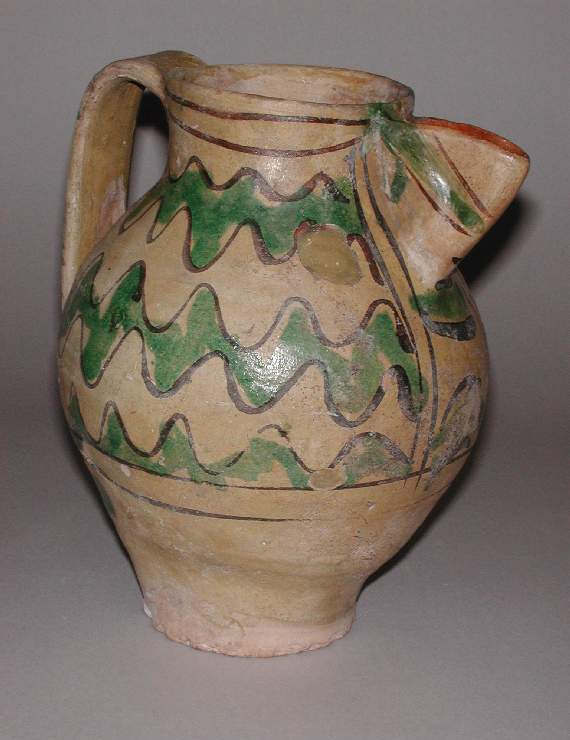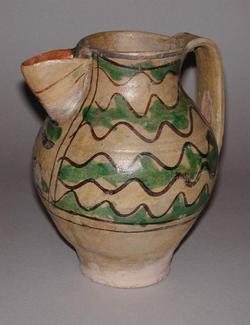Current Location: In storage
Maker(s)
Pottery:
Unidentified Orvieto pottery
(Probably)
Pottery:
Unidentified Lazio pottery
(Possibly)
Entities
Categories
Description
Late Medieval, lead-glazed earthenware jug, painted underglaze in manganese and green, decorated with undulating green lines.
Pale buff earthenware; the interior, base and a short distance above it unglazed; the rest thinly covered with yellowish lead-glazed. Painted underglaze in dark manganese and copper-green.
Shape 2. Swelling ovoid body, with flat base, cylindrical neck, applied folded spout and strap handle. The spout and handle are flanked by two vertical lines forming side panels, each occupied by two black-edged green lines undulating on both sides, with above and below, one undulating on one side. The lower part of the body and the neck are encircled by two horizontal manganese bands. On both sides of the spout and below it there are horizontal lines of alternate colours, and on the handle, two groups of three manganese horizontal lines alternate with three wider green.
Notes
History note: William Ridout; Christie's, 13 December 1938, The William Ridout collection of Italian majolica, European pottery, faience and delftware. probably part of lot 105; H.S. Reitlinger (d. 1950), The Reitlinger Trust, Maidenhead from whom transferred in 1991.
Legal notes
H.S. Reitlinger Bequest, 1950
Measurements and weight
Height: 19.5 cm
Acquisition and important dates
Method of acquisition: Bequeathed
(1950)
by
Reitlinger, Henry Scipio
Dating
13th Century
Medieval
Circa
1200
CE
-
1300
CE
Note
The decoration resembles the heraldic field described as barry nebuly or ondy, but probably has no heraldic significance. A variant of it occurs on C.16-1991. It was probably made in Orvieto as a jug decorated similarly but with spots instead of continuous colour between the undulating lines was recovered from cistern C of the Palazzetto Faina, Orvieto. However, comparable jugs were made in Northern Lazio. Vessels with undulating decoration have been found in Viterbo, and Rome.
People, subjects and objects depicted
Components of the work
Decoration
composed of
high-temperature colours
( manganese and copper-green)
Body
Diameter 15 cm
Base
Diameter 7.8 cm
Handle To Spout
Width 16 cm
Materials used in production
except the base and a short distance above it
Lead-glaze
Earthenware
Techniques used in production
Lead-glazing
Inscription or legends present
Inscription present: circular with blue border
- Text: WILLIAM RIDOUT COLLECTION [printed in blue] O./87 [in blue-black ink]
- Method of creation: Printed in blue and inscribed in blue-black ink
- Type: Label
Inscription present: in a circle
- Text: 7
- Location: On base
- Method of creation: In pencil
- Type: Inscription
References and bibliographic entries
Related exhibitions
Identification numbers
Accession number: C.17-1991
Primary reference Number: 47130
Packing number: EURCER 470
Stable URI
Audit data
Created: Saturday 6 August 2011
Updated: Tuesday 30 April 2024
Last processed: Wednesday 14 May 2025
Associated departments & institutions
Owner or interested party:
The Fitzwilliam Museum
Associated department:
Applied Arts





